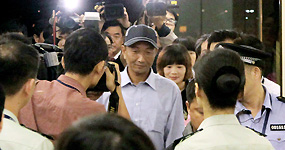
日本拒绝就抓扣中国渔船船长事件向中方道歉。日方在日中两个经济大国间争议上的立场,未出现任何软化的迹象。此前,日本作出让步,释放了中国船长。
日本检方周五释放了在东中国海有争议水域被其抓扣的这名船长。此次事件已在日中两国政府间引发了多年来最为严重的外交争执。
中国迎接这名船长回国后,要求东京方面就此次事件作出道歉和赔偿,并重申了对这名船长遭抓扣的有争议水域的主权要求。
官方新华社发表的一份声明表示:“日方对中国渔民渔船的扣押、调查以及任何形式的司法举措都是非法和无效的。日方必须就此次事件向中方作出道歉和赔偿。”
日本外务省周六表示:“尖阁列岛不存在需要解决的领土问题。中方要求道歉或赔偿的呼吁毫无根据,绝对不可接受。”
日本首相菅直人(Naoto Kan)周五在出席联合国大会(UN General Assembly)期间,以一种更加和缓的语气表示,日中两国是重要邻邦,必须相互合作。
人们原本期望中国船长詹其雄的获释将缓解这两个经常发生纠纷的邻国之间的短期摩擦,但此举却立刻让日本政府陷入指责声中:有关方面指责日本政府屈服于中方的压力。
对中国来说,在此事上持强硬态度也存在适得其反的风险,因为在中国已超越日本成为全球第二经济大国之际,这种态度将加剧亚洲各国对中国崛起的日趋加重的担忧。
在日中两国爆发新一轮不睦之时,中国与亚洲其它国家的关系也出现恶化。中国总理温家宝表示,(中日两国存在争议的)钓鱼岛是中国的“神圣领土”。此举表明,中国在领土主张上的态度正日趋强硬。
华盛顿尼克松中心(Nixon Center)中国问题专家唐安竹(Drew Thompson)表示:“亚洲非常担心,中国正变得更加武断,不那么愿意协商和妥协。因此,这些国家正越来越频繁地转向美国。”对于中国在南海诸岛问题上的态度,东南亚国家的焦虑情绪在与日俱增——中国大陆、越南、马来西亚、台湾、菲律宾和文莱都声称对这些岛屿拥有全部或部分主权。
这些不满之声给了美国在亚洲外交和安全问题上重塑其控制权的机会。
美国国务卿希拉里•克林顿(Hillary Clinton)利用7月份在河内召开的一次会议,宣布美国可以担任争议的调解人,令中国官员十分恼火。而美国总统巴拉克•奥巴马(Barack Obama)也于周五与东南亚领导人会面,讨论南海问题。
过去18个月,中国还与印度产生了一系列低级别的外交争议,而北京方面拒绝就朝鲜3月份击沉韩国战舰一事指责朝鲜,也引起了韩方的愤怒。
一些分析人士认为,北京方面态度更加强硬,是2012年中国领导层换届前的政治姿态所致。但也有人表示,这反映出中国领导人将经济实力转化为外交影响力的愿望。
日本就是亚洲政治潮流转向的一个佐证。
自去年上台后,日本民主党(DPJ)领导的新政府就一直试图改善与中国的关系。但中国对日本扣押中国渔船船长的反应是如此之强烈,可能会让一些民主党成员的观点显得更加有根据——他们认为,日本应加深与美国的联盟,同时增强自身投射军力的能力,以保护本国利益。
译者/何黎
http://www.ftchinese.com/story/001034795

Japan is refusing to apologise for detaining a Chinese fishing boat captain, showing no signs of softening in a dispute between the two economic powers after Japan gave ground and released him.
Japanese prosecutors on Friday released the captain whose detention in disputed waters in the East China Sea sparked the worst diplomatic row between Tokyo and Beijing in years.
China greeted the captain’s return by demanding an apology and compensation from Tokyo and restating its claim to the disputed waters where he was seized.
“It is unlawful and invalid for Japan to detain and investigate the boat captain and to take any legal measures against him,” said a statement issued by the official Xinhua news agency. “Japan must offer China an apology and compensation over this incident.”
“There is no territorial issue that needs to be resolved over the Senkaku,” Japan’s Foreign Ministry said on Saturday. “China calling for apology or compensation is groundless and is absolutely not acceptable.”
Naoto Kan, the Japanese prime minister, offered a more conciliatory tone, saying on Friday on the sidelines of the UN General Assembly that the two countries were important neighbours and must co-operate with one another.
It was hoped that the release of Zhan Qixiong would ease short-term frictions between the often fractious neighbours but it immediately exposed Japanese authorities to accusations that they had buckled in the face of pressure from Beijing.
For China there is also a risk that its tough approach could backfire as it feeds mounting concern across Asia about the rising power of an economy that has overtaken Japan as the world’s second largest.
The new bout of ill-feeling between Japan and China came as Chinese ties have soured with other countries in the region. Wen Jiabao, China’s premier, said the Diaoyu islands disputed by Japan and China were “sacred territory”, an indication of an increasingly bold attitude towards territorial claims.
“There is a lot of concern in the region that China is becoming more assertive and less willing to negotiate and compromise,” said Drew Thompson, a China specialist at Washington’s Nixon Center think-tank. “So these countries are turning to the US with more regularity.” Among south-east Asian countries there is growing anxiety about Beijing’s approach to several islands in the South China Sea claimed in full or in part by China, Vietnam, Malaysia, Taiwan, the Philippines and Brunei.
These rumblings of discontent have given an opportunity for the US to reassert itself in Asian diplomacy and security.
Hillary Clinton, US secretary of state, used a meeting in Hanoi in July to announce that the US could mediate in the disputes, to the annoyance of Chinese officials. Barack Obama, US president, met south-east Asian leaders on Friday to discuss the South China Sea issue.
China has also had low-level diplomatic arguments with India in the past 18 months. Beijing’s refusal to attack North Korea for the sinking of a South Korean warship in March also sparked anger in Seoul.
Some analysts see the harder attitude in Beijing as a result of political positioning before a 2012 leadership transition but others said it reflected a desire among Chinese leaders to turn economic strength into diplomatic leverage.
Japan is a case in point of the shifting political tide in Asia.
After taking office last year, Japan’s Democratic party-led government tried to improve relations with China. However, the harshness of China’s response to the detention of the fishing boat captain is likely to strengthen the argument of those DPJ members who believe that Japan should deepen its alliance with the US and acquire more ability to project military force in defence of its interests.
没有评论:
发表评论